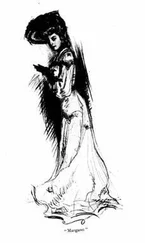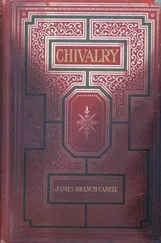James Cabell - The Rivet in Grandfather's Neck. A Comedy of Limitations
Здесь есть возможность читать онлайн «James Cabell - The Rivet in Grandfather's Neck. A Comedy of Limitations» весь текст электронной книги совершенно бесплатно (целиком полную версию без сокращений). В некоторых случаях можно слушать аудио, скачать через торрент в формате fb2 и присутствует краткое содержание. Жанр: Фэнтези, на английском языке. Описание произведения, (предисловие) а так же отзывы посетителей доступны на портале библиотеки ЛибКат.
- Название:The Rivet in Grandfather's Neck. A Comedy of Limitations
- Автор:
- Жанр:
- Год:неизвестен
- ISBN:нет данных
- Рейтинг книги:3 / 5. Голосов: 1
-
Избранное:Добавить в избранное
- Отзывы:
-
Ваша оценка:
- 60
- 1
- 2
- 3
- 4
- 5
The Rivet in Grandfather's Neck. A Comedy of Limitations: краткое содержание, описание и аннотация
Предлагаем к чтению аннотацию, описание, краткое содержание или предисловие (зависит от того, что написал сам автор книги «The Rivet in Grandfather's Neck. A Comedy of Limitations»). Если вы не нашли необходимую информацию о книге — напишите в комментариях, мы постараемся отыскать её.
The Rivet in Grandfather's Neck. A Comedy of Limitations — читать онлайн бесплатно полную книгу (весь текст) целиком
Ниже представлен текст книги, разбитый по страницам. Система сохранения места последней прочитанной страницы, позволяет с удобством читать онлайн бесплатно книгу «The Rivet in Grandfather's Neck. A Comedy of Limitations», без необходимости каждый раз заново искать на чём Вы остановились. Поставьте закладку, и сможете в любой момент перейти на страницу, на которой закончили чтение.
Интервал:
Закладка:
Aloud she said: "Oh, well! let's go and get some breakfast."
VII
And thus the situation stayed. Patricia told him nothing. And Rudolph Musgrave, knowing that according to his lights he had behaved not unhandsomely, was the merest trifle patronizing and rather like a person speaking from a superior plane in his future dealings with Patricia. Moreover, he was engrossed at this time by his scholarly compilation of Lichfield Legislative Papers prior to 1800, which was printed the following February.
She told him nothing. She was a devoted mother for two days' space, and then candidly decided that Roger was developing into the most insufferable of little prigs.
"And, besides, if he had never been born I would quite probably have lived to keep my teeth in a glass of water at night. And I can't help thinking of that privilege being denied me whenever I look at him."
She told Rudolph Musgrave nothing. She was finding it mildly amusing to note how people came and went at Matocton, and to appraise these people disinterestedly, because she would never see them again.
Patricia was drawing her own conclusions as to Lichfield's aristocracy. These people—for the most part a preposterously handsome race—were the pleasantest of companions and their manners were perfection; but there was enough of old Roger Stapylton's blood in Patricia's veins to make her feel, however obscurely, that nobody is justified in living without even an attempt at any personal achievement. The younger men evinced a marked tendency to leave Lichfield, to make their homes elsewhere, she noted, and they very often attained prominence; there was Joe Parkinson, for instance, who had lunched at Oyster Bay only last Thursday, according to the Lichfield Courier-Herald . And, meanwhile, the men of her husband's generation clung to their old mansions, and were ornamental, certainly, and were, very certainly, profoundly self-satisfied; for they adhered to the customs of yesterday under the comfortable delusion that this was the only way to uphold yesterday's ideals. But what, in heaven's name, had any of these men of Rudolph Musgrave's circle ever done beyond enough perfunctory desk-work, say, to furnish him food and clothes?
"A hamlet of Hamlets," was Patricia's verdict as to Lichfield—"whose actual tragedy isn't that their fathers were badly treated, but that they themselves are constitutionally unable to do anything except talk about how badly their fathers were treated."
No, it was not altogether that these men were indolent. Rudolph and Rudolph's peers had been reared in the belief that when any manual labor became inevitable, you as a matter of course entrusted its execution to a negro; and, forced themselves to labor, they not unnaturally complied with an ever-present sense of unfair treatment, and, in consequence, performed the work inefficiently. Lichfield had no doubt preserved a comely manner of living; but it had produced in the last half-century nothing of real importance except John Charteris.
VIII
For Charteris was important. Patricia was rereading all the books that Charteris had published, and they engrossed her with an augmenting admiration.
But it is unnecessary to dilate upon the marvelous and winning pictures of life in Lichfield before the War between the States which Charteris has painted in his novels. "Even as the king of birds that with unwearied wing soars nearest to the sun, yet wears upon his breast the softest down,"—as we learn from no less eminent authority than that of the Lichfield Courier-Herald —"so Mr. Charteris is equally expert in depicting the derring-do and tenderness of those glorious days of chivalry, of fair women and brave men, of gentle breeding, of splendid culture and wholesome living."
Patricia was not a little puzzled by these books. The traditional Lichfield, she decided in the outcome, may very possibly have been just the trick-work of a charlatan's cleverness; but, even in that event, here were the tales of life in Lichfield—ardent, sumptuous and fragrant throughout with the fragrance of love and roses, of rhyme and of youth's lovely fallacies; and for the pot-pourri, if it deserved no higher name, all who believed that living ought to be a uniformly noble transaction could not fail to be grateful eternally.
Esthetic values apart—and, indeed, to all such values Patricia accorded a provisional respect—what most impressed her Stapyltonian mind was the fact that these books represented, in a perfectly tangible way, success. Patricia very heartily admired success when it was brevetted as such by the applause of others. And while to be a noted stylist, and even to be reasonably sure of annotated reissuement for the plaguing of unborn schoolchildren, was all well enough, in an unimportant, high-minded way, Patricia was far more vividly impressed by the blunt figures which told how many of John Charteris's books had been bought and paid for. She accepted these figures as his publishers gave them forth, implicitly; and she marveled over and took odd joy in these figures. They enabled her to admire Charteris's books without reservation.
By this time Mrs. Ashmeade had managed, in the most natural manner, to tell Patricia a deal concerning Charteris. No halo graced the portrait Mrs. Ashmeade painted…. But, indeed, Patricia now viewed John Charteris, considered as a person, without any particular bias. She did not especially care—now—what the man had done or had omitted to do.
But the venerable incongruity of the writer and his work confronted her intriguingly. A Charteris writes In Old Lichfield; a Cockney drug-clerk writes The Eve of St. Agnes; a genteel printer evolves a Lovelace; and a cutpurse pens the Ballad of Dead Ladies in a brothel. It is manifestly impossible; and it happens.
So here, then, was a knave who held, somehow, the keys to a courtlier and nobler world. These tales made living seem a braver business, for all that they were written by a poltroon. Was it pure posturing? Patricia, at least, thought it was not. At worst, such dexterous maintenance of a pose was hardly despicable, she considered. And, anyhow, she preferred to believe that Charteris had by some miracle put the best of himself into these books, had somehow clarified the abhorrent mixture of ability and evil which was John Charteris; and the best in him she found, on this hypothesis, to be a deal more admirable than the best in Rudolph Musgrave.
"It is a part of Jack," she fiercely said. "It is, because I know it is. All this is part of him—as much a part of him as the cowardice and the trickery. So I don't really care if he is a liar and a coward. I ought to, I suppose. But at the bottom of my heart I admire him. He has made something; he has created these beautiful books, and they will be here when we are all dead. He doesn't leave the world just as he found it. That is the only real cowardice, I think—especially as I am going to do it——"
And later she said, belligerently: "If I had been a man I could have at least assassinated somebody who was prominent. I do wish Rudolph was not such a stick-in-the-mud. And I wish I liked Rudolph better. But on the whole I prefer the physical coward to the moral one. Rudolph simply bores me stiff with his benevolent airs. He just walks around the place forgiving me sixty times to the hour, and if he doesn't stop it I am going to slap him."
Thus Patricia.
IX
The world knows how Charteris was killed in Fairhaven by Jasper Hardress—the husband of "that flighty Mrs. Hardress" Anne had spoken of.
"And I hardly know," said Mrs. Ashmeade, "whether more to admire the justice or the sardonic humor of the performance. Here after hundreds of entanglements with women, John Charteris manages to be shot by a jealous maniac on account of a woman with whom—for a wonder—his relations were proven to be innocent. The man needed killing, but it is asking too much of human nature to put up with his being made a martyr of."
Читать дальшеИнтервал:
Закладка:
Похожие книги на «The Rivet in Grandfather's Neck. A Comedy of Limitations»
Представляем Вашему вниманию похожие книги на «The Rivet in Grandfather's Neck. A Comedy of Limitations» списком для выбора. Мы отобрали схожую по названию и смыслу литературу в надежде предоставить читателям больше вариантов отыскать новые, интересные, ещё непрочитанные произведения.
Обсуждение, отзывы о книге «The Rivet in Grandfather's Neck. A Comedy of Limitations» и просто собственные мнения читателей. Оставьте ваши комментарии, напишите, что Вы думаете о произведении, его смысле или главных героях. Укажите что конкретно понравилось, а что нет, и почему Вы так считаете.



